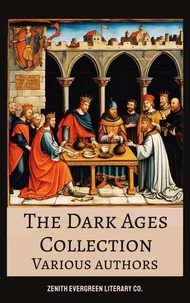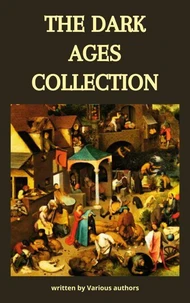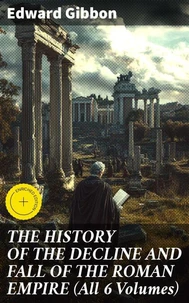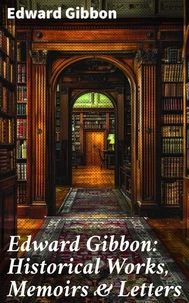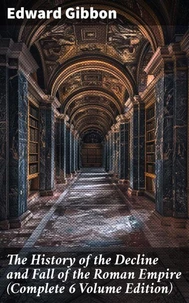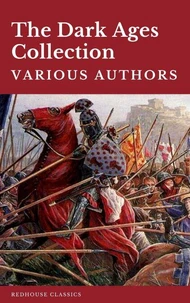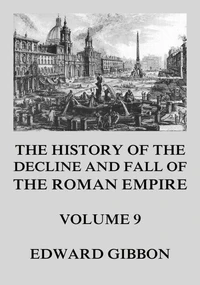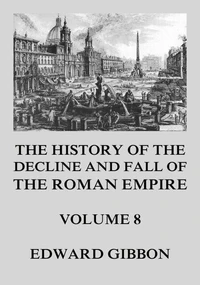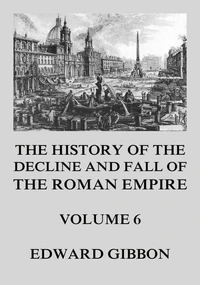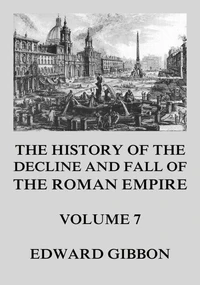THE HISTORY OF THE DECLINE AND FALL OF THE ROMAN EMPIRE (All 6 Volumes)
Par :Formats :
Disponible dans votre compte client Decitre ou Furet du Nord dès validation de votre commande. Le format ePub est :
- Compatible avec une lecture sur My Vivlio (smartphone, tablette, ordinateur)
- Compatible avec une lecture sur liseuses Vivlio
- Pour les liseuses autres que Vivlio, vous devez utiliser le logiciel Adobe Digital Edition. Non compatible avec la lecture sur les liseuses Kindle, Remarkable et Sony
 , qui est-ce ?
, qui est-ce ?Notre partenaire de plateforme de lecture numérique où vous retrouverez l'ensemble de vos ebooks gratuitement
Pour en savoir plus sur nos ebooks, consultez notre aide en ligne ici
- Nombre de pages848
- FormatePub
- ISBN859-65--4774588-4
- EAN8596547745884
- Date de parution07/12/2023
- Protection num.Digital Watermarking
- Taille4 Mo
- Infos supplémentairesepub
- ÉditeurDIGICAT
Résumé
Edward Gibbon's monumental work, "The History of the Decline and Fall of the Roman Empire, " spans six volumes and meticulously chronicles the complex socio-political dynamics that led to the disintegration of one of history's greatest empires. Gibbon employs an eloquent and sophisticated literary style, interweaving narrative history with incisive analysis while incorporating vast historical sources.
Set against the backdrop of 18th-century historiographical developments, the work embodies the Enlightenment ideals of reason and inquiry, as Gibbon critically examines the interplay of moral and societal decay amidst rising barbarian influences and the transformative impacts of early Christianity. Gibbon, a British historian and Member of Parliament, drew upon his classical education and extensive travels throughout Europe to provide both depth and nuance to his historical narratives.
The book reflects his fascination with the causes of empire, as well as his personal belief in reason and skepticism towards dogmatic religion. Gibbon's experiences and intellectual pursuits, including his controversial views on Christianity's role in the empire's demise, are palpable throughout this ambitious investigation. Readers looking for a profound understanding of the mechanisms behind the rise and fall of civilizations will find in Gibbon's work an indispensable resource.
His blend of engaging prose and rigorous scholarship makes this history not only informative but also a compelling read, appealing to both historians and general readers alike. "The History of the Decline and Fall of the Roman Empire" is a cornerstone of Western historical literature that remains relevant and provocative today.
Set against the backdrop of 18th-century historiographical developments, the work embodies the Enlightenment ideals of reason and inquiry, as Gibbon critically examines the interplay of moral and societal decay amidst rising barbarian influences and the transformative impacts of early Christianity. Gibbon, a British historian and Member of Parliament, drew upon his classical education and extensive travels throughout Europe to provide both depth and nuance to his historical narratives.
The book reflects his fascination with the causes of empire, as well as his personal belief in reason and skepticism towards dogmatic religion. Gibbon's experiences and intellectual pursuits, including his controversial views on Christianity's role in the empire's demise, are palpable throughout this ambitious investigation. Readers looking for a profound understanding of the mechanisms behind the rise and fall of civilizations will find in Gibbon's work an indispensable resource.
His blend of engaging prose and rigorous scholarship makes this history not only informative but also a compelling read, appealing to both historians and general readers alike. "The History of the Decline and Fall of the Roman Empire" is a cornerstone of Western historical literature that remains relevant and provocative today.
Edward Gibbon's monumental work, "The History of the Decline and Fall of the Roman Empire, " spans six volumes and meticulously chronicles the complex socio-political dynamics that led to the disintegration of one of history's greatest empires. Gibbon employs an eloquent and sophisticated literary style, interweaving narrative history with incisive analysis while incorporating vast historical sources.
Set against the backdrop of 18th-century historiographical developments, the work embodies the Enlightenment ideals of reason and inquiry, as Gibbon critically examines the interplay of moral and societal decay amidst rising barbarian influences and the transformative impacts of early Christianity. Gibbon, a British historian and Member of Parliament, drew upon his classical education and extensive travels throughout Europe to provide both depth and nuance to his historical narratives.
The book reflects his fascination with the causes of empire, as well as his personal belief in reason and skepticism towards dogmatic religion. Gibbon's experiences and intellectual pursuits, including his controversial views on Christianity's role in the empire's demise, are palpable throughout this ambitious investigation. Readers looking for a profound understanding of the mechanisms behind the rise and fall of civilizations will find in Gibbon's work an indispensable resource.
His blend of engaging prose and rigorous scholarship makes this history not only informative but also a compelling read, appealing to both historians and general readers alike. "The History of the Decline and Fall of the Roman Empire" is a cornerstone of Western historical literature that remains relevant and provocative today.
Set against the backdrop of 18th-century historiographical developments, the work embodies the Enlightenment ideals of reason and inquiry, as Gibbon critically examines the interplay of moral and societal decay amidst rising barbarian influences and the transformative impacts of early Christianity. Gibbon, a British historian and Member of Parliament, drew upon his classical education and extensive travels throughout Europe to provide both depth and nuance to his historical narratives.
The book reflects his fascination with the causes of empire, as well as his personal belief in reason and skepticism towards dogmatic religion. Gibbon's experiences and intellectual pursuits, including his controversial views on Christianity's role in the empire's demise, are palpable throughout this ambitious investigation. Readers looking for a profound understanding of the mechanisms behind the rise and fall of civilizations will find in Gibbon's work an indispensable resource.
His blend of engaging prose and rigorous scholarship makes this history not only informative but also a compelling read, appealing to both historians and general readers alike. "The History of the Decline and Fall of the Roman Empire" is a cornerstone of Western historical literature that remains relevant and provocative today.



